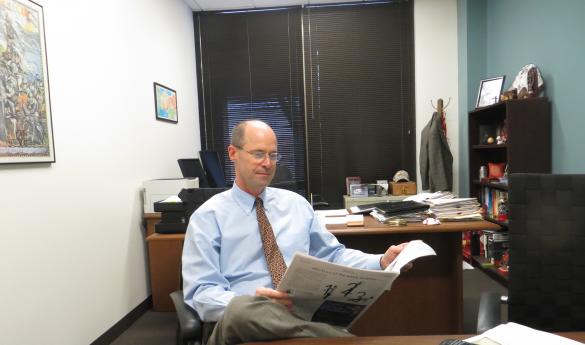Mason business program provides opportunities to students
Between the business incubator program and the recent deal with Autonomous University of Nuevo León overseen by the State Department, the Mason Enterprise Center (MEC is becoming an integral part of Mason’s image. According to the Mason strategic plan, the Mason Enterprise Center’s role is to supply small business owners with counseling, training, networking, mentoring, and temporary office space. The university-based economic development enterprise provides business owners with access to resources to help them develop their companies. Beyond aiding businesses, the MEC has recently been making an effort to connect with Mason students.
MEC’s Fairfax office is located on University Drive between the Fairfax Volunteer Fire Department and the Central Fairfax Chamber of Commerce. The office of Keith Segerson, executive director of the MEC, in on the first floor. The three floors above him are all used by a variety of companies, ranging from Department of Defense contractors to Central and South American Cosmetics. There are plans for a fifth floor, but they are still in the formative stages.
“George Mason can be a complicated place,” Segerson said, “especially to someone on the outside who doesn’t understand that, doesn’t understand academia. I can serve as a resource to local government and business to facilitate our engagement. Much of that benefits students for workforce development, internships, project work, career opportunities, and those types of things.”
The MEC’s connection with the rest of the university can seem tangential initially. The business incubator that composes most of the office building often hosts companies that have little to do with the university, but according to Segerson, these businesses can work more closely with education than most students realize.
“Student classes, like business classes, public policy classes, who want case study work, we will identify companies willing to work with these classes. They’ll break up into groups… and they work to develop a business plan, market analysis, things that are relevant to their course work. It’s on a real life company, it’s not a textbook, it’s working with real business,” Segerson said. “So the students benefit by working in industry and the businesses benefit with research and guidance with research and support they’d normally have to pay for separately.”
In the past, the business and public policy classes have helped figure out what location a company can best market its product and provide financial reviews. Beyond the classroom, companies that work in the business incubator also approach the MEC seeking potential interns.
“We can help with internship opportunities. Students can go to the career services and we get a call saying there are students interested in internships with small, local companies and we can help make those introductions.”
One company in the MEC’s business incubator, Conffianz, has hosted interns from several universities around Virginia, but most have come from George Mason. The company specializes in over-the-counter cosmetics for Latina women.
“Our current intern is a senior,” said Peter T. Snizter Jr., the managing director for Conffianz. “When she first came on, she was supporting out promotional efforts and marketing events. Then she worked on some customer service initiatives. Most recently she’s been putting together a proposal for social media.”
Snizter also mentioned that there could be job opportunities for a Mason student in the near future.
“We’re looking for a new intern in the spring, looking specifically into the US-Hispanic market,” said Snizter. “The candidate needs to be fluent in Spanish, but doesn’t have to be a business major, just enthusiastic about the beauty industry and Hispanic culture.”
But Segerson says there are benefits to Mason students beyond classroom workshops and internships.
“If there are students who are entrepreneurial in nature, who have a business idea and have developed intellectual property and want to create a company around that, they can give us a call and we’ll give them help for free.”
Looking towards the future, Segerson shares President Ángel Cabrera’s vision of an increased international focus. Two particular upcoming projects are pushing this emphasis for the MEC.
“We’re interested in setting up a program at the [Songdo] campus that would work with local entrepreneurs that have high growth, high value companies that have the potential to go international,” said Segerson. “We would do some training and vetting in Korea with our expert as well as Mason faculty and then vet and select those entrepreneurs that have the best opportunities for success in the US and bring them here to establish a business with them… our students can then benefit from internship opportunities.”
Segerson also related a story about a shortage of affordable housing in Malaysia. He met with a Malaysian government agency tasked with building 80,000 units of affordable housing this year. To this end the agency has requisitioned modular housing, but there’s not an adequate workforce to build the infrastructure to install it.
“They don’t have the skillset. It’s quite a dilemma. We’re working to create programs that can help train their workforce, and they’re interested in sending students from Malaysia to George Mason for four years of training.”
In addition to decorations from China, Korea, and a map of Turkey, there are two framed documents on the Segerson’s wall the executive director was quick to point out: the Administrator of the Year award from Mason (1999-2000) and his Master’s Degree from Mason’s School of Management.
“What we’re doing is working to create a stronger economy by developing new businesses and growing established ones that create new jobs that mason graduates would be qualified for,” Segerson said.

